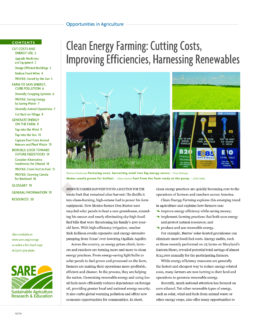Anaerobic digesters: systems that convert biomass, particularly food waste and animal manure, into energy.
Biodiesel: a fuel made from renewable, biodegradable sources, usually vegetable oil or animal fat.
Bioenergy: energy derived from recent living organisms.
Biofuel: solid, liquid or gas fuel consisting of, or derived from, biological materials.
Biogas: a gas mixture of primarily methane and carbon dioxide, produced by anaerobic digestion or fermentation of organic matter, including manure, sewage sludge, municipal solid waste, or any other biodegradable feedstock.
Cellulose: a complex carbohydrate found in the cell walls of plants.
Carbon neutral: any activity that results in no net carbon emissions to the atmosphere.
Energy audit: a survey and analysis of the energy flows in a building or system including specific recommendations for improving efficiency and conservation.
Ethanol: an alcohol-based fuel produced by fermenting and distilling sugars from plant materials.
Feedstock: a raw biomass material that is converted to another form or product.
Net energy gain: when the energy obtained from an energy source is greater than the energy required to produce it.
Net metering: a state-level electricity policy that allows consumers producing energy to hook up to the grid. When customers are net metered, the utilities can only charge for energy consumption minus production.
Photovoltaic (PV) cells: solar cells or solar photovoltaic arrays that convert sunlight into electricity.
Renewable energy: an energy resource that is replaced rapidly by natural processes.
Switchgrass (Panicum virgatum): a warm-season grass that is a dominant species of the central North American tallgrass prairie.
Volatile organic compounds (VOCs): organic chemical compounds that under normal conditions can vaporize and enter the atmosphere.
